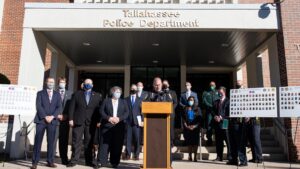
Home to tens of thousands of college students, Tallahassee is no longer the safe haven, small town many thought it was.
According to a study using FBI crime statistics, Tallahassee was ranked 126 out of 134 cities making it one of the least safe cities to live in Florida. To add to that statistic, the Tallahassee Police Department released a report last month following its two-year investigation into sex trafficking, which accumulated more than 170 arrests.
The investigation began in November 2018 when images of children were being posted on a website that advertises sex for money. TPD later established a task force with the Special Victims Unit called “Stolen Innocence.” According to a statement by TPD Chief Lawrence Revell, Operation Stolen Innocence led to 106 people being charged with felonies, 72 charged with misdemeanors and another 19 facing federal charges.
“I know it’s hard to believe that something like this happens here in our community,” said Lorena Vollrath-Bueno, felony chief for the State Attorney’s Office in Tallahassee. “But it does.”
The recent crackdowns on sex trafficking have led several students, especially young women, to question the safety of their universities in Tallahassee. Zaire Johnson, a chemistry pre-medical student at Florida A&M, said she does not feel secure in her own home.
“You would think with so many young college students Tallahassee would be much safer than it is,” Johnson said. “But it’s the exact opposite. I think because there are so many young women here this is the prime city for sex trafficking. It makes me nervous.”
The list of persons arrested under sex trafficking charges include a physical education coach from Leon High School and a write-in political candidate, showing how sex offenders do not always conform with stereotype. Several of the other defendants are older women who arranged “plays” with young girls in exchange for cash.
According to data from the International Organization for Migration and the Polaris Project, more than 40 percent of children who are trafficked are recruited by their own family members. Other trafficking methods are tied directly to drug and opioid abuse.
“It sickens me to know how easily a child can be taken into sex trafficking,” Johnson said. “I don’t even want to stay in Tallahassee long term, let alone raise my children in a city where trafficking is so frequent.”
Vollrath-Bueno estimates that more than 50,000 people are trafficked each year and the average child is between 12 and 14 when he or she enters. Vollrath-Bueno also said that children at most risk for being trafficked come from unstable homes, suffer mental health issues, are frequent runaways or have drug issues.
“We in local, state and federal law enforcement are all working together as a team to dismantle their networks and to pursue, prosecute and punish those who are involved,” Chief Revell said. “Operation Stolen Innocence is an excellent example of how all levels of law enforcement can put it all together and get it done, to take down a child trafficking network right here in our community.”
For more information on Operation Stolen Innocence visit https://www.justice.gov/usao-ndfl/press-release/file/1338086/download. If you suspect someone is a sex trafficker or is being trafficked, contact law enforcement or the Human Trafficking Hotline at 1-888-373-7888.